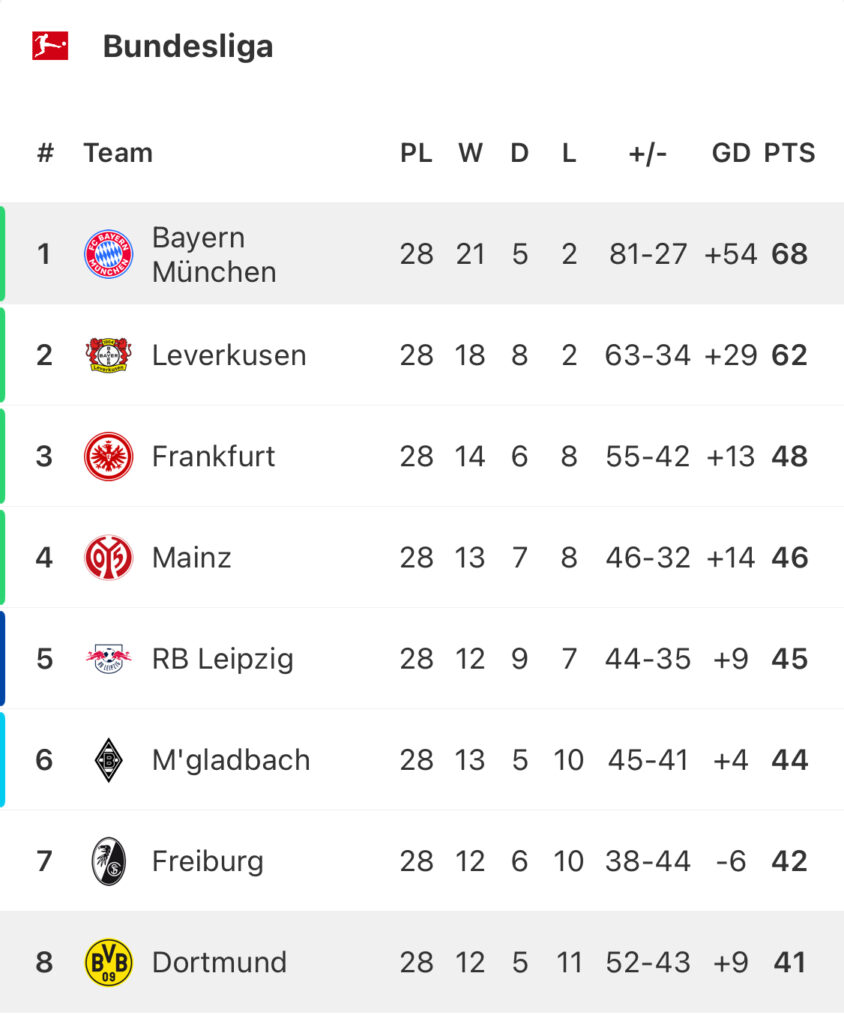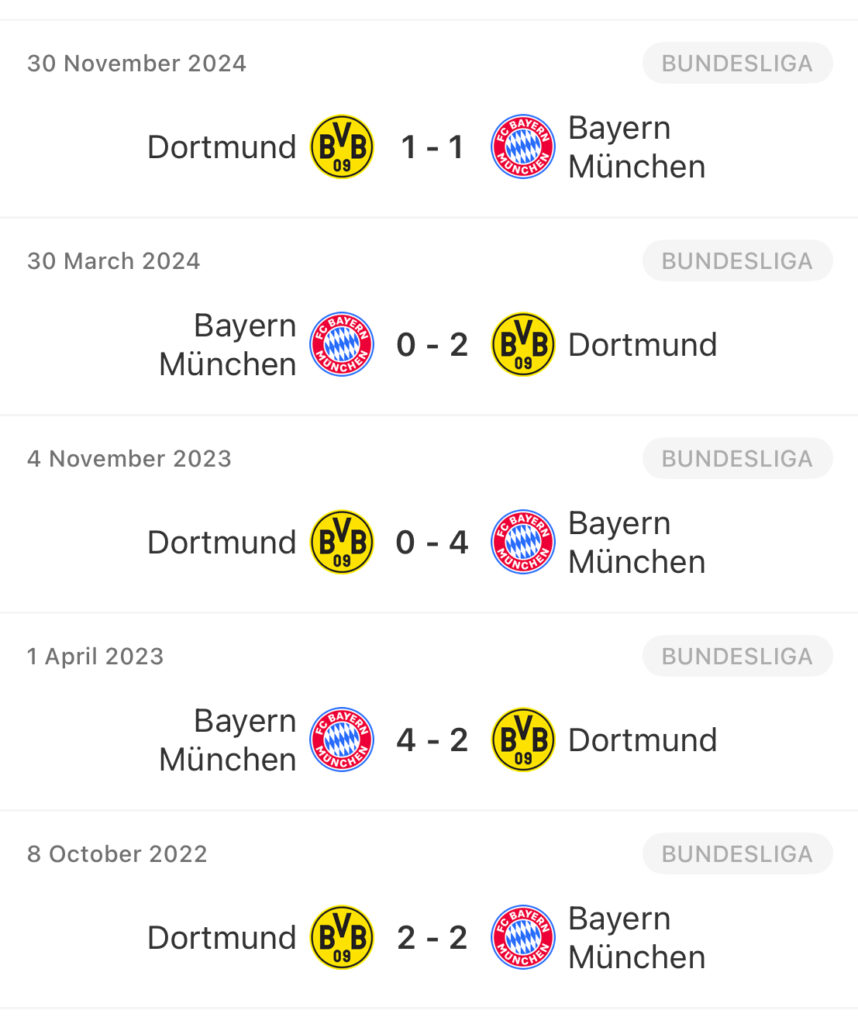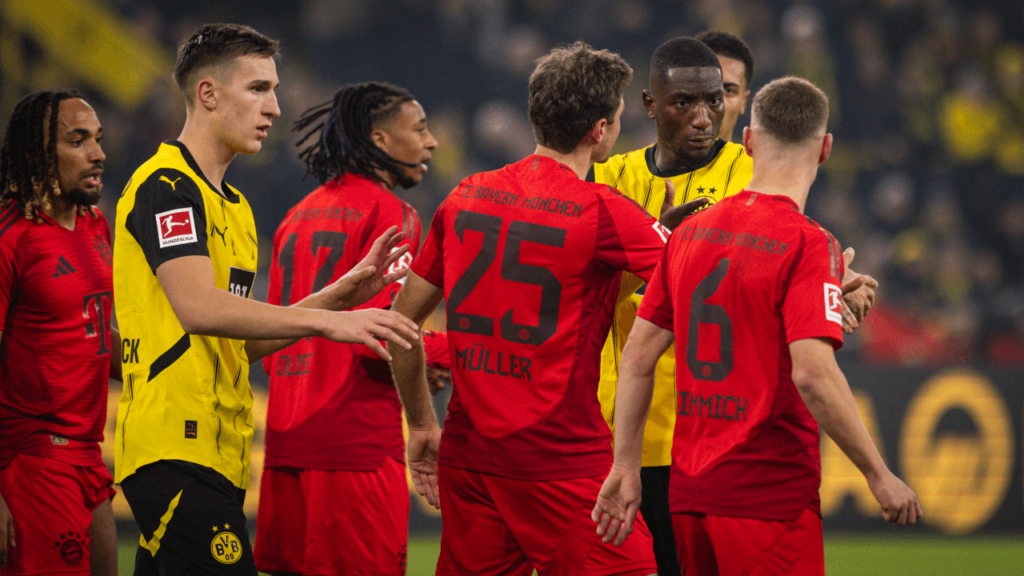Forget city borders, this is the battle for dominance, identity, and the pride of German football. Here’s what fuels Der Klassiker.
When Borussia Dortmund and Bayern Munich get together, fans pack the stadiums, and millions tune in on TV. When the two met in the Champions League final at Wembley in 2013, an all-German affair reinforced the Bundesliga on the world stage and stoked the world’s attention to German football. Just over a decade later, things look a little different. Bayern are leading the title charge, as is usually the case. However, Dortmund sit eighth in the league. Yet still, this weekend’s meeting will dominate the headlines, draw international viewership, and carry a weight far heavier than league positions.
Because this isn’t just a match; it’s a cultural collision.

Unlike El Clásico in Spain, or Manchester United vs Liverpool, Bayern Munich vs Dortmund doesn’t quite have the same hatred attached, but it’s certainly a heated affair. The friction really began in the 1990s, as Dortmund rose to challenge Bayern’s domestic reign in the Bundesliga era of German football, winning titles in 1995 and 1996 before lifting the Champions League in 1997.
Bayern, ever the dominant force, weren’t used to being upstaged. The rivalry intensified in the 2010s when Jürgen Klopp’s style of football lit up Germany, and Dortmund, backed by a fan-first philosophy and savvy recruitment, did the unthinkable: they outplayed and outshone Bayern for two straight seasons.
But Bayern responded the only way Bayern know how, by asserting dominance. They reclaimed the title, signed Dortmund’s star players (Lewandowski, Götze, Hummels), and reinforced the image many already held: That Bayern don’t just beat their rivals, they absorb them.
‘Der Klassiker’ or Just Clever Marketing?
Some German fans roll their eyes at the term “Der Klassiker.” It doesn’t have the historical gravity of El Clásico, and it wasn’t born from political or religious divides. Instead, it was coined by the media, eager to position the Bundesliga as a global product.
But, semantics aside, the tension between these clubs is real, and it captures global attention. Unlike some rivalries that burn out when one team slips, Bayern-Dortmund has endured through imbalance. The games are almost always intense and unpredictable, even when the title isn’t on the line. Like this weekend.
Bayern are league leaders, chasing yet another title in a run that has seen them crowned champions 11 times in the last 12 seasons. Dortmund, meanwhile, are clinging to Europa League hopes. On paper, this is not a title decider. But ask any fan; this match still matters.

Two Clubs, Two Philosophies. What makes this rivalry compelling is not geography. It’s ideology.
Bayern Munich represent consistency, power, and elite professionalism. They are Germany’s corporate superclub. The club is polished, globally branded, and rarely apologetic for its size or spending.
Borussia Dortmund, on the other hand, are the people’s club. Their home, Signal Iduna Park, is not just a stadium. It’s a cathedral of noise. The Yellow Wall of the Südtribüne, is the largest standing terrace in European football, a heaving display of community, loyalty, and defiance. Even in seasons of setbacks, Dortmund fans show up every weekend.
There’s pride in that contrast. Where Bayern attract stars and polish them into title machines, Dortmund are often a launchpad for young talent, Erling Haaland, Jude Bellingham, Ousmane Dembélé. They develop, they inspire, and then, often, they lose them.
To understand the emotional temperature of this fixture, look at how the fans talk about it.
For many Dortmund supporters, Bayern symbolise the very system they resent. They’re the reason the Bundesliga has lacked true competition. They’re the rich kids who win every prize and then buy the best players to do it again. The transfers of Lewandowski and Götze weren’t just moves, they were emotional ruptures.

For Bayern fans, they see their rivals as plucky but inconsistent, great for the neutral, but never truly threatening in the long term. And yet, they never underestimate them because when Dortmund click, they can still tear anyone apart.
The dynamic is layered. It’s not pure hatred. It’s closer to resentment, laced with grudging respect.
This isn’t a clash of equals this time around. Bayern look set to claim the league once more. Dortmund, meanwhile, are navigating a tricky domestic campaign, having failed to improve on last season. But what’s always at stake in Der Klassiker is pride. Perception. Narrative.
Der Klassiker is many things: a marketing tool, a domestic power struggle, a cultural tug-of-war. But more than anything, it’s a mirror of German football, showing us both its strengths and its flaws.
A league loved for its fan-first model, its 50+1 ownership rule, its affordability and atmosphere, but weighed down by a lack of genuine competition at the top. It’s a league that protects fan culture like no other, yet a system that allows one club to dominate relentlessly. It’s a country that produces extraordinary talent but struggles to retain it. It’s a football culture built on ideals, tradition, and values, and one still figuring out how to compete in a modern, globalised football economy.
This game may not be a local derby or a match-up fueled on decades of hatred. But it’s far more than just a fixture. It’s the game that drives the Bundesliga machine on the global stage and is often a showcase for the very best in German talent.
(Images from IMAGO)
You can follow every game from the Bundesliga on FotMob – with in-depth stat coverage including xG, shot maps, and player ratings. Download the free app here.
